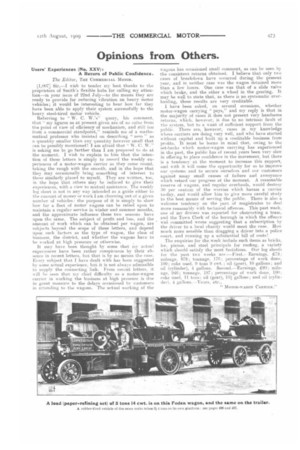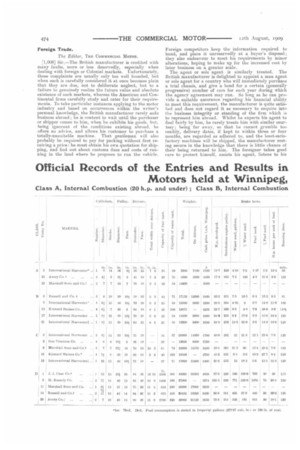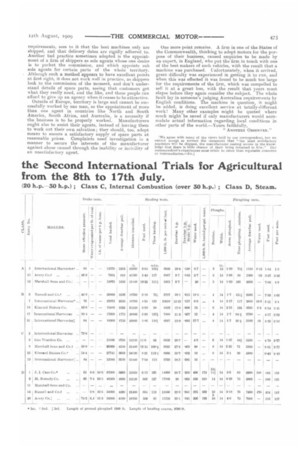Opinions from Others.
Page 11

Page 12

Page 13

If you've noticed an error in this article please click here to report it so we can fix it.
Users' Experiences (No. XXV) i
A Return of Public Confidence.
The Editor, THE COMMERCIAL MOTOR.
11,007] Sir,—I wish to tender my best thanks to the proprietors of Smith's flexible hubs forcalling my attention—in your issue of 22nd July—to the means they are ready to provide for reducing vibration on heavy motor vehicles; it would be interesting to hear how tar they have been able to apply their system successfully to the heavy steel-tired motor vehicle.
Referring to " W. C. W.'s" query, his comment, that my figures as at present given are of no value from the point of view of efficiency of mechanism, and stilt less from a. commercial standpoint," reminds me of a mathematical professor who insisted on describing " zero " as a. quantity smaller than any quantity however small that can be possibly mentioned! I am afraid that '' W. C. W." is asking me to go farther than I am prepared to do at the moment. I wish to explain to him that the intention of these letters is simply to record the weekly experiences of a motor-wagon carrier as they come round, taking the rough with the smooth, and in the hope that they may occasionally bring something of interest to those similarly placecf to myself. They are written, too, in the hope that others may be induced to give their experiences, with a view to mutual assistance. The weekly log sheet is not in any way intended as a guide either to the anmunt of money or work I am churning out of a given number of vehicles ; the purpose of it is simply to show how far a fleet of motor wagons can be relied upon to maintain a regular service in winter and summer months, and the approximate influence these two seasons have upon the same. The subject of profit and loss, and the amount of work which can be obtained per wagon, are subjects beyond the scope of these letters, and depend upon such factors as the type of wagon, the class of business, the district, and whether the wagons have to be worked at high pressure or otherwise.
It may have been thought by some that my actual experiences have been rather conspicuous by their absence in recent letters, but that is by no means the case. Every subject that I have dealt with has been suggested by some actual experience, but it is not always admissible to supply the connecting link. From recont letters, it will be seen that my chief difficulty as a motor-wagon carrier in working the business at high pressure is due in great measure to the delays occasioned by customers in attending to the wagons. The actual working of the wagons has occasioned small comment, as can be seen by the consistent returns obtained. I believe that only two cases of breakdown have occurred during the present year, and in neither case was the wagon detained more than a few hours. One case was that of a slide valve which broke, and the other a wheel in the gearing. It may be well to state that, as there is no systematic overhauling, these results are very creditable. I have been asked, on several occasions, whether motor-wagon carrying "pays," and my reply is that in the majority of cases it does not present very handsome returns, which, however, is due to no intrinsic fault of the system, but to a want of sufficient support from the public. There are, however, cases in my knowledge where carriers are doing very well, and who have started without capital and built up a creditable business from profits. It must be borne in mind that, owing to the set-backs which motor-wagon carrying has experienced in the past, the public has of recent years been very slow in offering to place confidence in the movement, but there is a tendency at the moment to increase this support, and with it will come the opportunity for us to improve our systems and to secure ourselves and our customers against many small causes of failure and annoyance which retard our progress at the moment. A reasonable reserve of wagons, and regular overhauls, would destroy 30 per centum of the worries which harass a carrier to-day, and would allow him to give more careful study to the best means of serving the public. There is also a welcome tendency on the part of magistrates to deal more reasonably with technical offences. This past week, one of my drivers was reported for obstructing a tram, and the Town Clerk of the borough in which the offence wai committed wrote suggesting that a subscription by the driver to a local charity would meet the case. How much more sensible than dragging a driver into a police court, and running up a substantial bill of costs!
The enquiries for the week include such items as bricks, ice, pianos, and steel principals for roofing, a variety which should satisfy the most fastidious. Our log sheets for the past two weeks are :—First.— Earnings, £73; mileage, 878; tonnage, 176; percentage of work done, 100; coke used, 9 tons 9 cwt. ; oil (gear), 10 gallons; and oil (cylinder), 4 gallons. Second.—Earnings, £80; mileage, 946; tonnage, 197; percentage of work done, 100; coke used, 11 tons ; oil (gear), 10i gallons ; and oil (cylinder). 4 gallons.—Yours, etc.,
" Moroit-wAGoN CAR HMI." Foreign Trade.
The Editor, Tim E Cohnumacial. MOTOR.
11,008] Sir,—The British manufacturer is credited with many faults, more or less deservedly, especially when dealing with foreign or Colonial markets. Unfortunately, these complaints are usually only too well founded, but when each is carefully considered it at once becomes plain that they are due, not to deliberate neglect, but to a failure to genuinely realize the future value and absolute existence of such markets, whereas the American and Continental firms carefully study and cater for their requirements. To take particular instances applying to the motor industry and based on occurrences within the writer's personal knowledge, the British manufacturer rarely seeks business abroad; he is content to wait until the purchaser or shipper comes to him, when he exhibits his goods, but, being ignorant of the conditions existing abroad, be offers no advice, and allows his customer to purchase a totally-unsuitable machine. That gentleman will also probably be required to pay for packing without first receiving a price: he must obtain his own quotation for shipping, and find out about customs dues and costs of running in the land where he proposes to run the vehicle. Foreign competitors keep the information required to hand, and place it unreservedly at a buyer's disposal; they also endeavour to meet hi % requirements by minor alterations, hoping to make up for the increased cost by later business on a greater scale.
The agent or sole agent is similarly treated, The British manufacturer is delighted to appoint a man agent or sole agent for a country who will immediately purchase a trial chassis, and give a bond for a certain (generally progressive) number of cars for each year during which the agency agreement may run. So long as he can provide a suitable assurance regarding his financial ability to meet this requirement, the manufacturer is quite satisfied and does not regard it as necessary to enquire into the business integrity or standing of the firm which is to represent him abroad. Whilst he expects his agent to deal fairly by him, he rarely treats him with similar courtesy being far away, so that he cannot grumble too readily, delivery dates, if kept to within three or four months, are regarded as adhered to, and the least-satisfactory machines will be shipped, the manufacturer resting secure in the knowledge that there is little chance of their being returned to him. The foreigner takes good care to protect himself, assists his agent, listens to his requirements, sees to it that the best machines only are shipped, and that delivery dates are rigidly adhered to. Another bad practice sometimes adopted is the appointment of a firm of shippers as sole agents whose one desire is to pocket the commission, and which appoints sub sole agents for certain parts of the whole territory. Although such a method appears to have excellent points at first sight, it does not work well in practice, as shippers look to the commission of the moment, and don't understand details of spare parts, seeing that customers get what they really need, and the like, and these people can afford to give up an agency when it ceases to be attractive.
Outside of Europe, territory is large and cannot be successfully worked by one man, so the appointment of more than one agent in countries like North and South America, South Africa, and Australia, is a necessity if the business is to be properly worked. Manufacturers ought also to assist their agents, instead of leaving them to work out their own salvation ; they should, too, adopt means to ensure a satisfactory supply of spare parts at reasonable prices. Complaints need investigation in a manner to secure the interests of the manufacturer against abuse caused through the inability or incivility of an unsatisfactory agent. One more point remains. A firm in one of the States of the Commonwealth, thinking to adopt motors for the purpose of their business, caused enquiries to be made by an expert, in England, who put the firm in touch with one of the hest makers of such vehicles, with the result that a machine was purchased. Unfortunately, when it arrived, great difficulty was experienced in getting it to run, and when this was effected it was found to be much too large for the requirements of the firm, which was compelled to sell it at a great loss, with the result that years must elapse before they again consider the subject. The whole fault lay in someone's judging Australian requirements by English conditions. The machine in question, it might be added, is doing excellent service at totally-different work! Many other examples might be quoted where much might be saved if only manufacturers would accumulate actual information regarding local conditions in other parts of the world.—Yours faithfully,
ANOTTIER OBSER VER . '
We agree with ninny of the views held by our correspondent, but we Cannot accept as correct the statement that "the least satisfactory machines will he shipped, the manufacturer resting secure in the knowledge that there is little chance of their being returned to hint." Our correspondent's experiences must relate to other than reputable concerns or intermediaries.—En.}


















